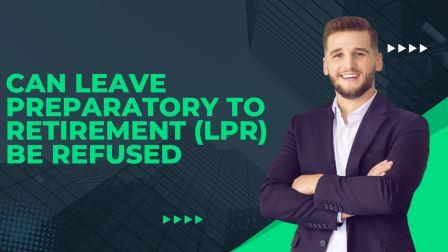As you approach retirement, planning becomes paramount. Taking leave preparatory to retirement (LPR) can be a valuable tool for a smooth transition. But can this leave ever be refused? This article will delve into the world of LPR, exploring the circumstances under which it might be denied and how to maximize your chances of approval.
Embrace the Journey to Retirement with Leave Preparatory to Retirement (LPR)
LPR is a period of approved leave granted to employees nearing retirement. It allows them to adjust to the upcoming change and potentially tie up loose ends at work before officially retiring. While LPR regulations can vary by employer and location, it generally involves a period of paid or partially paid leave preceding your official retirement date.
Review Company Policies and Guidelines on LPR
The first step in understanding LPR is to familiarize yourself with your company’s specific policies. These policies typically outline eligibility requirements, the application process, and the duration of approved leave. Human Resources (HR) departments are a great resource for clarifying any questions you may have regarding LPR policies within your organization.
Plan Ahead for Retirement
Taking LPR is an excellent opportunity to solidify your retirement plans. Use this time to:
- Finalize your financial planning: Review your retirement savings, adjust your budget for a fixed income, and explore any additional financial considerations.
- Prepare for healthcare transitions: Understand your healthcare options in retirement and ensure you have the necessary coverage.
- Consider lifestyle changes: Plan activities you’d like to pursue in retirement and potentially explore downsizing your living situation.
Submit a Formal Request for LPR – Specimen Letter
Once you have a solid plan and understand your company’s policies, it’s time to submit a formal request for LPR. A well-crafted letter demonstrates your commitment to a smooth transition and increases your chances of approval. Here’s a sample letter format you can adapt:
Your NameYour AddressDate
HR DepartmentCompany NameCompany Address
Dear [HR Contact Name],
This letter formally requests a leave of absence preparatory to retirement, effective [desired start date] and lasting for [desired LPR duration].
I have been employed with [Company Name] for [number] years and will reach retirement eligibility on [retirement date]. Taking LPR will allow me to [briefly explain how LPR will help your transition].
I have completed [mention any relevant training or handover activities] to ensure a smooth handover of my responsibilities. I am also happy to assist with further training or documentation as needed during this period.
Thank you for considering my request. I am confident that taking LPR will facilitate a seamless transition for myself and the company.
Sincerely,
[Your Name]
Provide Supporting Documentation
Along with your letter, you may need to provide additional documentation to support your LPR request. This could include:
- A copy of your official retirement notification
- A proposed handover plan for your responsibilities
- Any documentation related to planned medical appointments or other relevant reasons for LPR
Consult with HR or Retirement Advisors for LPR and Retirement
Don’t hesitate to leverage the expertise available within your organization. HR representatives can answer questions about LPR policies and guide you through the application process. Retirement advisors can offer valuable insights and support as you plan for your financial future.
How to Plan Your Workload and Handover for Retirement
Taking LPR provides an opportunity to ensure a smooth handover of your responsibilities. Develop a plan that outlines key tasks, upcoming deadlines, and knowledge transfer procedures. This helps minimize disruption for your colleagues and ensures a seamless transition.
How to Enjoy Your Leave of Absence for Retirement (LPR)
LPR is a well-deserved break before retirement. Use this time to focus on your well-being and explore your future plans. Travel, pursue hobbies, and connect with loved ones – all while taking care of any outstanding tasks related to your retirement transition.
Maintain Communication During Leave of Absence for Retirement (LPR)
Maintaining open communication with your employer during LPR can be beneficial. This allows you to address any questions or concerns that may arise and ensures a smooth return (if applicable).
How to Prepare for Your Return and Transition into Retirement
Some employers may offer the option to return to work part-time after taking LPR. If you plan to return, use the remaining LPR period to prepare mentally and logistically for your reintegration.
How Long Does LPR Last?
The duration of LPR varies depending on company policy and individual circumstances. Typical LPR periods range from a few weeks to a few months.
Conclusion
While LPR can be a valuable tool for a smooth transition to retirement, it’s important to remember that approval isn’t guaranteed. By understanding your company’s policies, planning effectively, and submitting a well-prepared request, you can significantly increase your chances of a successful LPR application.
Ultimately, clear communication and collaboration with your employer are key throughout the LPR process. Taking advantage of available resources and planning ahead will ensure a successful transition, allowing you to embrace retirement with confidence and peace of mind.
Frequently Asked Questions on Various Online Platforms Like Google, Quora, Reddit and Others
- Can you be denied retirement? Technically, no. Once you reach retirement age and meet eligibility requirements, you can retire. However, employers can deny your request for LPR under certain circumstances.
- What happens if you don’t prepare for retirement? Without proper planning, retirement can be financially and emotionally stressful. LPR provides valuable time to address these concerns and ensure a smooth transition.
- Can you fire someone close to retirement? Generally, no. Age discrimination laws protect employees nearing retirement. However, termination may be possible under specific circumstances, unrelated to retirement plans.
- What if I leave the government before retirement eligibility? Benefits and consequences vary depending on your specific situation and government agency. It’s crucial to consult with your HR department or benefits advisor to understand the implications of leaving before reaching eligibility.
